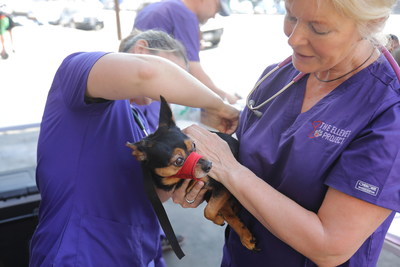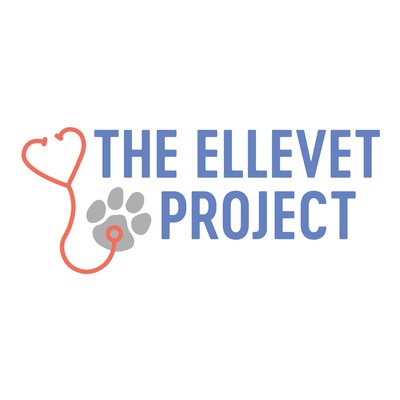Homelessness and Pet Ownership: The ElleVet Project Offers Much Needed Medical Care to Vulnerable Pets
- Advertisement -
LOS ANGELES, Aug. 30, 2022 /PRNewswire/ — In many of our lives, pets are nothing short of lifesavers, and this is especially true for those who are homeless. According to the 2021 Annual Homeless Assessment Report, more than 326,000 persons were homeless on any given night in that year.

According to estimates by the School of Social Work University of Southern California Los Angeles, as many as 25% of those who are homeless live with pets.2 Sadly, despite having a significant impact on the health, safety, and life of their pet parents, these animals are frequently disregarded. Pet writer Amy DeYoung explores the correlation between pet ownership and healthier outcomes for homeless people and how The ElleVet Project is making a difference.
1. Pets Offer Stability
Pets often serve a larger-than-life role in the lives of individuals who often have no close relationships. As Amanda Howland, Co-Founder of The ElleVet Project, a national mobile relief effort providing free veterinary care to pets in vulnerable communities, explains, “Having a pet is an anchor for them.” Many individuals experiencing homelessness are alone, separated, or turned out from their families, and pets can provide them with a greater sense of purpose and motivation to keep going during hard times.
2. Pets Provide Emotional Support
Pets can significantly impact an individual’s mental health in a variety of ways. Humans have a need to be touched and playing with a pet has been shown to increase dopamine and serotonin levels, according to HelpGuide.org.4 The common human desire to be needed by others is fulfilled by the owner/pet relationship, giving the owner a reason to keep moving forward. Howland shares a story about a young woman whose dog was receiving care from The ElleVet Project. At the age of 16, this young woman had been shot in a drive-by shooting while at a friend’s house. She began suffering from crippling levels of anxiety in the aftermath. Later, she was able to start her recovery with the help of her emotional support dog, and her dog continued to support her while she was experiencing homelessness.
3. Pets Can Improve Physical Safety
Pets are an essential part of a person’s safety, especially when they are experiencing homelessness. Howland recounted countless stories of individuals, especially women who represent about 3 in 10 people experiencing homelessness according to The U.S. Department of Housing and Urban Development, who were protected by their dogs1. In many instances, dogs protected them when someone tried to enter their tent uninvited at night. It’s not uncommon for women who are unhoused to stay up all night out of fear for their safety. Having a dog to protect them makes a massive difference in their physical security and gives them a chance to sleep, knowing their dog is watching over them.
4. Pets Provide Health Benefits
In the case of people experiencing homelessness, a pet may be their biggest reason to keep going and take care of themselves so that they can be there for their pet. The U.S. Department of Health and Human Services has even been shown that a person experiencing homelessness has decreased levels of high-risk behaviors, such as alcohol and drug usage, when caring for a pet3. In the study they found that caring for a pet helped teens better manage their diabetes. During the study, teens cared for a pet fish by feeding the fish twice a day and checking the fish tank’s water levels. The group caring for a pet fish checked their blood glucose levels more than the teens without a fish, showing how the responsibility of caring for a pet can inspire greater dedication to one’s own health. In a story published this month by HelpGuide.org research has shown that pet parents have lower cholesterol and triglyceride levels, which are common contributing factors in heart disease.
5. Pets Facilitate Connection with Others
Another benefit pets provide is an immediate connection with others. Howland shares, “When you talk with people experiencing homelessness about their pets, it’s incredibly helpful to break down conversation barriers.” According to Smith College’s School for Social Work, having a pet has been shown to increase how often people interact and socialize with people experiencing homelessness3. This is critical, especially when so many people who are unhoused feel invisible to society.
The Ellevet Project Provides Solutions to the Challenges of Homelessness and Pet Ownership
As shown, pets can be crucial to people’s well-being while they are unhoused. Howland shares, “It makes us The ElleVet Project want to take the best possible care and set them up for success.” Unfortunately, the struggles of having a pet while experiencing homelessness come with its own unique challenges. Common struggles include shelter limitations and access to medical care, food, and everyday pet care supplies, resulting in significant stress to the pet parent. Many people experiencing homelessness choose to stay on the streets in unsafe conditions rather than move to a shelter, leaving their pets and they also may feed their pets before themselves, causing even further struggles.
Many shelters do not allow pets to stay with their owners, especially if their pet is unvaccinated, which is where The ElleVet Project helps. The ElleVet Project was founded in 2020 in response to the lack of resources that the homeless and their pets have access to and the COVID-19 pandemic. Out of a 38-foot RV, also known as the ElleVan, multiple veterinarians travel around the United States to treat pets of people who are unhoused. Within the first two months of service, The ElleVet Project treated more than 1,200 pets and met thousands of people who are unhoused. One of the most common treatments the ElleVan veterinarians provide are vaccinations so that the pet can stay in animal-friendly shelters with their pet parents. Howland explains, “By providing vaccinations, we are also helping people get into shelters too.”
Along with vaccinations, The ElleVet Project provides free veterinary care and supplies to pets of the homeless. This often includes a physical examination. If the pet needs emergency care, The ElleVet Project will get in touch with local veterinary surgeons and pay them to perform the surgery and provide necessary aftercare, and if the pet requires ongoing medication, The ElleVet Project connects the pet parent with free or low-cost clinics in the area and provides them with any medication needs they have.
The ElleVet Project is a 501c3 that relies on donations to purchase vaccines and medical supplies, as well as, to pay for emergency surgeries. You can donate and learn more through their website ellevetproject.org. Follow the ElleVet project on Facebook and Instagram @theellevetproject and see some of the thousands of pets treated by The ElleVet Project team.
References
- The U.S. Department of Housing and Urban Development. (2022, February). The 2021 Annual Homeless Assessment Report to Congress. Retrieved July 29, 2022.
- Rhoades, H., Winetrobe, H., & Rice, E. (2015, April). Pet ownership among homeless youth: Associations with Mental Health, service utilization and housing status. Child psychiatry and human development. Retrieved August 26, 2022.
- Brewbaker, E. J. (2012). The experience of homelessness and the human-companion animal bond : a quantitative study : a project based upon an investigation at San Francisco Community Clinic
Consortium/ Veterinary Street Outreach Services, San Francisco, California. Retrieved August 29, 2022. - Robinson, L. (2022, May 17). The health and mood-boosting benefits of pets. HelpGuide.org. Retrieved July 29, 2022.
- U.S. Department of Health and Human Services. (2018, February). The power of pets. National Institutes of Health. Retrieved July 29, 2022.


![]() View original content to download multimedia:https://www.prnewswire.com/news-releases/homelessness-and-pet-ownership-the-ellevet-project-offers-much-needed-medical-care-to-vulnerable-pets-301614817.html
View original content to download multimedia:https://www.prnewswire.com/news-releases/homelessness-and-pet-ownership-the-ellevet-project-offers-much-needed-medical-care-to-vulnerable-pets-301614817.html
SOURCE The ElleVet Project
 Disclaimer: The above press release comes to you under an arrangement with PR Newswire. Agrigate Global takes no editorial responsibility for the same.
Disclaimer: The above press release comes to you under an arrangement with PR Newswire. Agrigate Global takes no editorial responsibility for the same.

